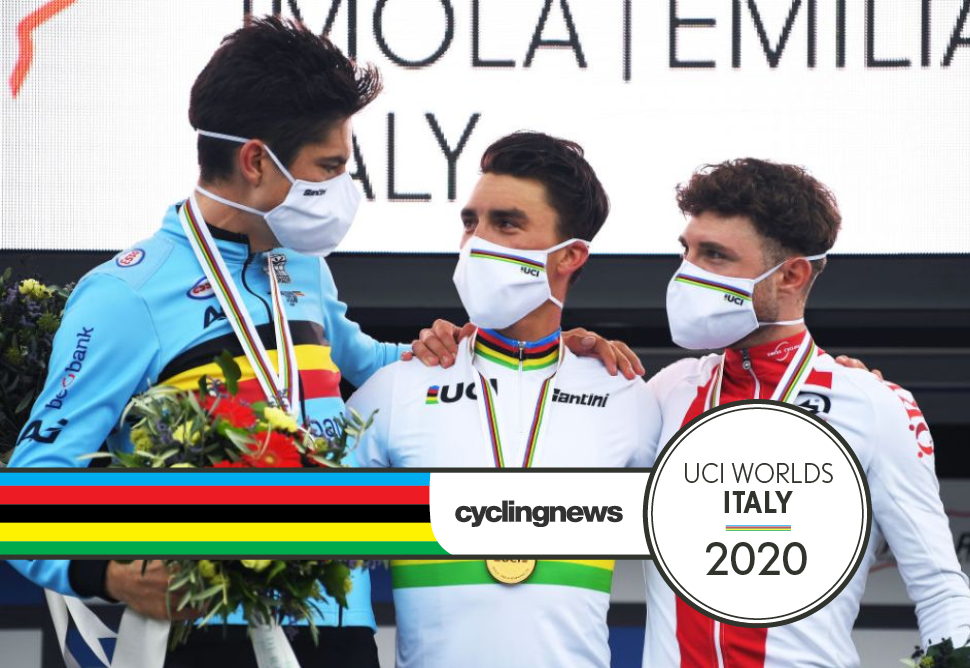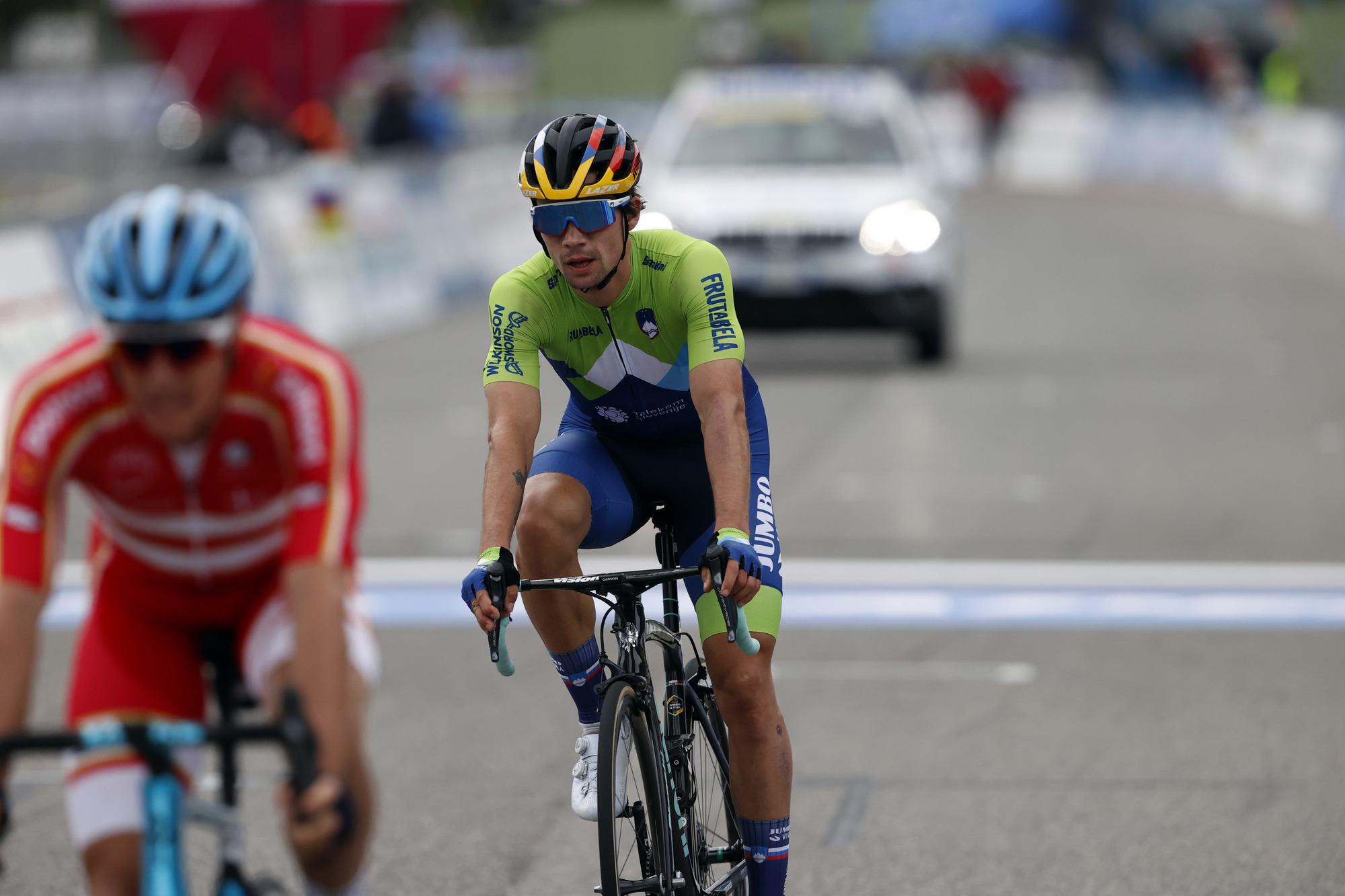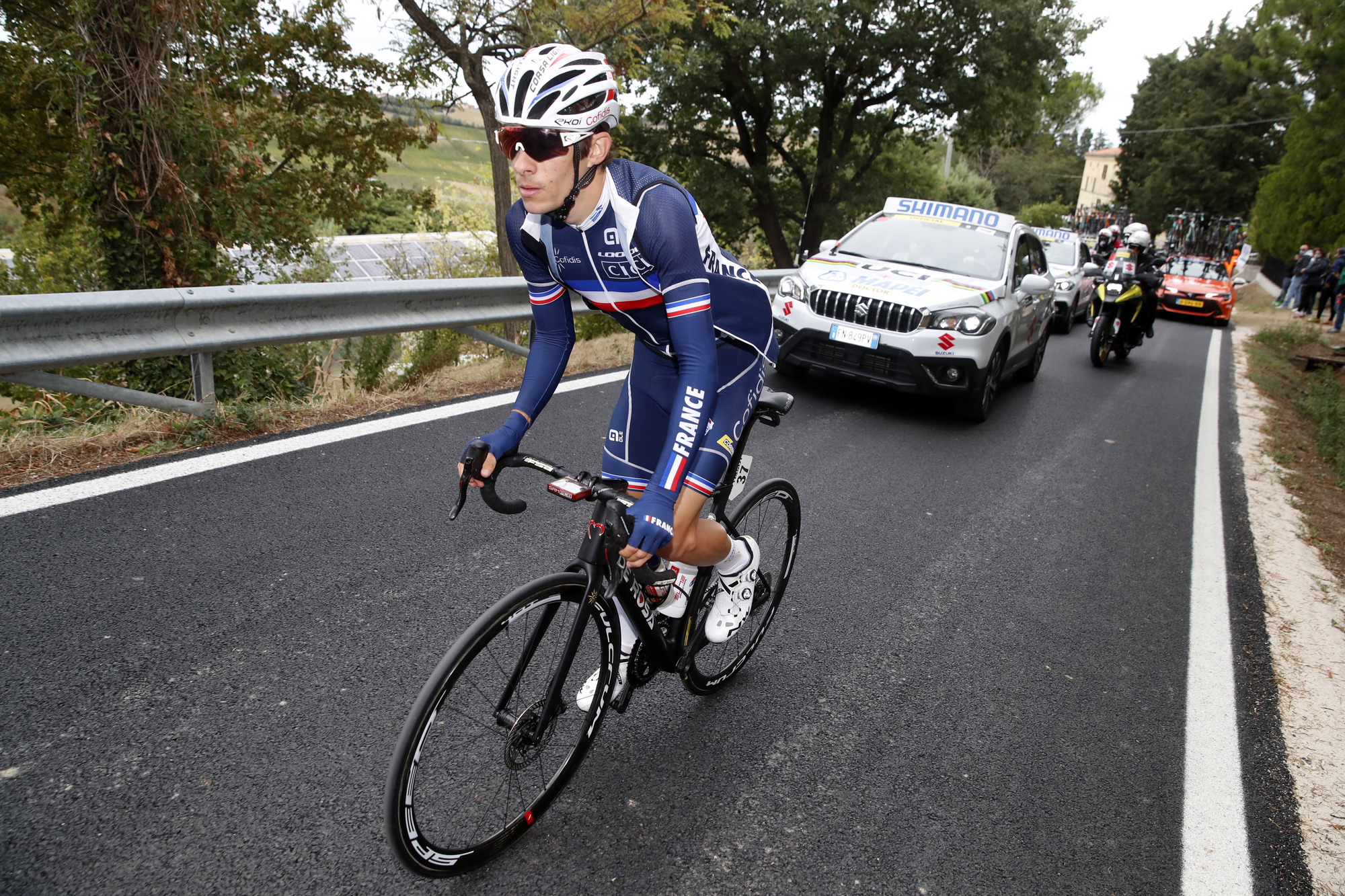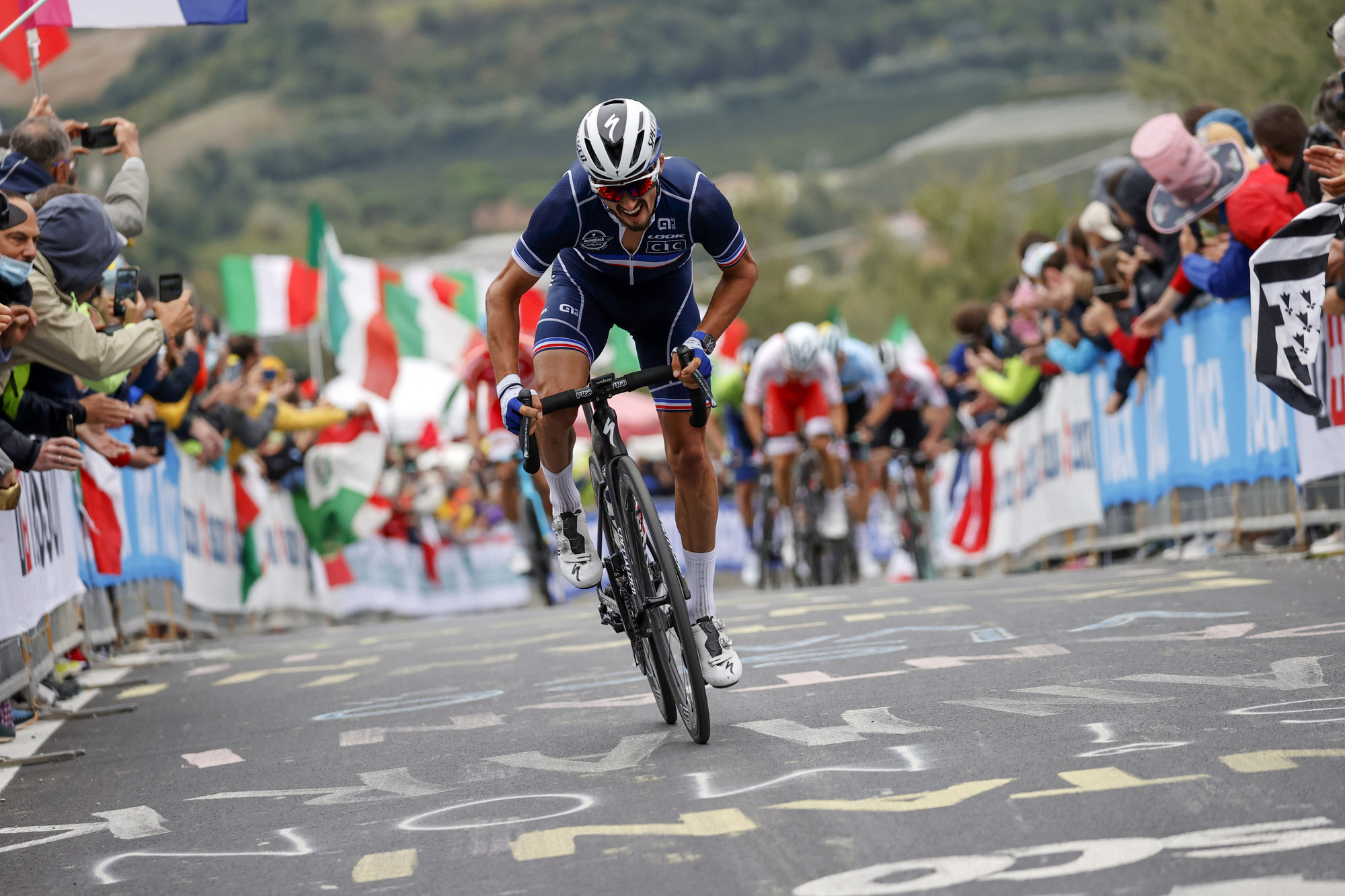6 conclusions from the elite men's 2020 Road World Championships
The Tour de France effect, Roglic's work, Guillaume Martin's key role, and more

Sunday's men's road race drew and end to a 2020 Road World Championships that at one point looked like they might not be held at all. In the end, in the new location of Imola, Julian Alaphilippe (France) proved the strongest man on the day, attacking to victory on the final climb.
Wout van Aert (Belgium) and Marc Hirschi (Switzerland) rounded out the podium at the end of a tough day of racing, with 258km on the menu – nine laps of a 28.8km circuit which featured a total of 4,600 metres of elevation.
The race blew up in the finale, with Alaphilippe making what would turn out to be th winning move on the final climb of the day. A lot went on beyond that, though. Here, we take a look at the six big conclusions from the men's road race.
Alaphilippe cuts his cloth for the Worlds
In his post-race press conference, Julian Alaphilippe was told that Paolo Bettini had approved of his build-up to the Imola Worlds, remarking that it bore similarities to his own approach to his own world title wins of 2006 and 2007. On each occasion, Bettini won a stage early in the Vuelta and then used the remainder of the race as an extended training camp before pulling out a couple of days before the finish in Madrid.
Alaphilippe won stage 2 of this year's Tour de France and spent three days in yellow, but by the final week, it was clear that his mind was drifting towards Imola. He produced cameos in support of Sam Bennett, infiltrated breaks and made attacks, but he was also careful to sit up and conserve his energy every time his day's work was done.
"I tried to do my best for the team, but I was always focused on the Worlds," Alaphilippe admitted.
The silver medallist, by contrast, scarcely relented through the whole of September. Wout van Aert won two stages of the Tour, but he was also Primož Roglič's key lieutenant more or less every day and he competed for the win in two time trials – on the Tour and at the Worlds – in the lead-in to Sunday's race.
Get The Leadout Newsletter
The latest race content, interviews, features, reviews and expert buying guides, direct to your inbox!
Fatigue didn't seem to weigh on Van Aert, who maintained his own remarkably high level in Imola, but he was facing a different Alaphilippe to the man he encountered at Milan-San Remo seven weeks ago.
On that occasion – after an admittedly more amenable final climb – Van Aert was able to catch the Frenchman on the descent of the Poggio and beat him on the Via Roma. On Sunday, once Alaphilippe opened a gap on Cima Gallisterna, there was no way back.
As well as the Tour just past, Alaphilippe was asked about the Tours to come. His fifth place of a year ago suggested that he might one day target overall victory in Paris, but he downplayed the idea on Sunday evening.
"It's not something I've placed as an objective for my career," he said. "At least in the short term." (BR)
Roglic couldn't have done much for Van Aert

Couldn't or wouldn't? In Belgium, Primož Roglič's contribution to the chase effort in the final 11 kilometres was already being parsed and analysed like the Zapruder film in the hour after the race, but Wout van Aert was unwilling to play any part in the brewing polemic over his Jumbo-Visma teammate's performance. He diffused questions about the issue in the mixed zone and press conference in Imola, and again when he landed in Eindhoven airport late on Sunday evening.
"After seven hours of racing, it is not always a question of wanting to do something, but also of being able to do something. I certainly think Primož wanted to help me, but he was just as tired as the rest of the group," Van Aert told Sporza.
"I think it's a shame that there's so much commotion around it. Primoz really did his best. I saw that myself in person, so I can judge it best."
When Alaphilippe danced away from everyone on the Gallisterna, Van Aert was, by some distance, the quickest man in the chase group that formed behind him. Roglič's chances of the rainbow jersey were slim by that point, and, according to a Belgian view of the world, he should have reciprocated Van Aert's work on his behalf at the Tour by devoting himself fully to the pursuit of Alaphilippe here.
Tellingly, there were no complaints about Roglič from the others in the group either. "The cooperation was there to chase Alaphilippe down," said Michal Kwiatkowski (fourth), a thought echoed by bronze medallist Marc Hirschi.
A week on from the trauma of losing the Tour de France at the last, perhaps a tired Roglič simply did all that he could. A couple of showy turns on the front for Van Aert weren't going to close the gap on a flying Alaphilippe. Or, as Tuttobici put it: "Roglic came to Imola empty of legs and head." (BR)
The Tour de France makes the difference
The results of the men's road race don't lie. Five of the top six riders and eight of the top ten riders in the men's road race all rode the Tour de France before the World Championships.
Specific training perhaps counted in the time trial but three weeks of intense racing clearly provided riders with the endurance and ability to suffer that made the difference during the 258.2km road race and especially on the steep climb of the Cima Gallisterna when Alaphilippe made his move.
Alaphilippe was not at his very best early in the The Tour de France but the daily racing gave the Frenchman the explosive power he needed to attack alone and then the endurance to stay away on the drive to the finish line.
Only Jakob Fuglsang and Michael Mathews had not ridden the Tour de France and managed to finish in the top ten but they made little impact on the race.
Now it will be fascinating to see how the fitness gained but also the accumulated fatigue of the Tour de France will play a part in the Classics. (SF)
Guillaume Martin the MVP in Alaphilippe's supporting cast

Guillaume Martin was making his first appearance for France's elite men's team, but his performance bore echoes of the last time he was selected for the World Championships, some nine years ago in Copenhagen. On that occasion, Martin played a key role in teeing up Pierre-Henri Lecuisinier's victory in the junior road race, but in the years since, he had been repeatedly overlooked by national coaches at both under-23 and elite level.
The oversight was all the more glaring in recent years. Martin had the form and the aptitude to help Alaphilippe in both Bergen and Innsbruck, but he was somehow deemed surplus to requirements. This year, on the back of a fine Tour with his new team Cofidis, he was finally selected, and his work was invaluable to the French cause on the last lap.
"Julian told me to be vigilant and not to let anything go, so that's what I did," Martin said in the mixed zone afterwards.
Martin made the effort that pinned back Tadej Pogačar and Tom Dumoulin on the Mazzolano, tracked the moves that followed and even clipped off the front ahead of the Cima Gallisterna to force Belgium to chase. Others, like Rudy Molard and Nans Peters, played their part, but Martin helped to ensure that the race played out according to coach Thomas Voeckler's preferred scenario: Alaphilippe against the best on the steep slopes of the Gallisterna. There will be plenty of competition for the five places on the French team at the Tokyo Olympics next summer, but it's hard to imagine Martin will be left out in the cold again. (BR)
Italy saves the Worlds
Vincenzo Nibali and the Italian men's team came up short in the men's road race but the home national rightly left Imola with a sense of pride and satisfaction after organising the World Championships in just 20 days.
As Elisa Longo Borghini said after winning a bronze medal in the women's road race: Italy was seen as the COVID-19 virus spreaders of Europe. Now they are seen as an example in the fight against the pandemic after limiting the return of the virus.
When Switzerland threw in the towel, Italy was arguably the only country that could have safely put on a World Championships. Using the infrastructure of the Imola moto racing circuit allowed for a safe race environment for the riders, officials and the UCI.
Most people respected the social distancing rules and wore masks even outdoors, with even IOC President Thomas Bach forced to admit that cycling has been a role model of organisation for the Tokyo Games in 2021. Italy saved the Worlds and so helped save the UCI's finances.
In strictly sporting terms, Nibali and Italy at least tried their hardest against the likes of Alaphilppe and Van Aert, as did Longo Borghini against the dominance of the Dutch women. Filippo Ganna became the first ever Italian to win the men's time trial world title and will wear the rainbow jersey in the opening time trial of the Giro d'Italia in Palermo on Saturday. (SF)
So much more racing to come

The World Championships usually mark the end of the season, with the new world champion showing off the rainbow jersey at Il Lombardia before riders hang up their wheels and enjoy a holiday.
The rescheduled COVID-19 season has changed all that, with the worlds marking the passage from the Tour de France to the Classics and the Giro d'Italia. It feels like early August but it is in fact almost October. Yet the sport faces its busiest, most intense six weeks of racing between now and November 8, with a men's WorldTour race going on virtually every day and a busy women's calendar too.
Riders dashed for a late evening flight from Italy to Belgium on Sunday so they could get ready for the BinckBank Tour, Wednesday's Fleche Wallonne and then the other Ardennes Classic followed by the Cobbled Classics.
Others prepared to head south to Palermo for the Grande Partenza of the Giro d'Italia or recover quickly and hope the Vuelta a Espana will go ahead and so give them some to aim for.
October 25 has been dubbed as cycling's Super Sunday because the Giro d'Italia ends in Milan, the Vuelta a España climbs the Tourmalet and there is the men's and new women's Paris-Roubaix.
We have already seen some superb racing since August 1, which has helped save professional cycling from ruin but there is so much more racing still to come. (SF)

Stephen is one of the most experienced member of the Cyclingnews team, having reported on professional cycling since 1994. He has been Head of News at Cyclingnews since 2022, before which he held the position of European editor since 2012 and previously worked for Reuters, Shift Active Media, and CyclingWeekly, among other publications.